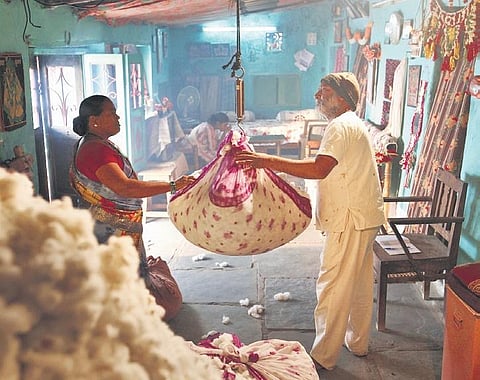

Sthal (A Match) explores the tradition of arranged marriages in rural India, where, says its director Jayant Digambar Somalkar, the “process” is followed to a tee. That of a girl sitting before a row of interrogators, from her to-be-husband’s family, asking her indiscreet questions about height and weight, confirming her skin tone and caste, and not much else.
Somalkar has made his film—one of a relentless pursuit for an arranged match—from the perspective of a young girl, Savita. Through it, he has highlighted issues of patriarchy, colourism and other social evils deeply rooted in society. Somalkar’s debut Marathi feature as a writer-director is to have its world premiere at the prestigious 48th Toronto International Film Festival (TIFF, Sept 7-17).
His is the only Indian film in the Discovery section, which showcases the first and second features of emerging filmmakers from around the world. Somalkar, who wrote and directed an award-winning short, Iyatta: Class (2016), and also co-wrote and co-directed the Amazon Prime Original Series, Guilty Minds (2022), discusses the making of the film ahead of the TIFF premiere. Excerpts from the conversation:
What have TIFF organisers noted about Sthal’s inclusion in the prestigious Discovery section?
There’s a line they said that has stayed with me. They noted how an arranged marriage affects everybody in the family.
Sthal explores the tradition of arranged marriages in rural India. How different is it from arranged marriages in cities?
I have shown the reality of a small village like the one I grew up in. Sthal does not show the big fat weddings of a certain class in cities or even as shown in OTT series like Made in Heaven set in Delhi.
There’s no melodrama, nothing is larger than life, no wedding planners in my film. It is, in fact, shot in my village, Dongargaon, in the Chandrapur District of Maharashtra, so the behavioural nuances of a young girl, or of families as they sit across each other for match-making are all very different from that of big cities.
Nandini Chikte plays the protagonist Savita. How did you find her?
The search for Savita was quite interesting. Nandini is a third-year student in the college I went to—I’ve shown the college in my film. She came for the auditions and was persistent that she could do better if she had a second audition. She said I can dance and cry! I said we’ve recorded your work and we’ll get back. She followed the crew to another city, an hour away from her home. I gave her a scene to prepare, she did a monologue and it did turn out to be a better performance. I noticed that she had talent, patience, a hunger and the spirit for hard work.
Was it only reasons of budget that made you cast first-time actors?
If you get the look of the film right, it’s said that half your job is done. I needed an authentic look for my film. That is the reason I chose first-time actors. Sure it had its challenges. I had to work on their body language, loosen them up, and teach them how to act before the camera.
Why did you switch lanes to join films? What kind of films have you been inspired by?
I have an engineering background but I’ve always been drawn towards the creative arts. I could paint and write poems but I didn’t have a clear idea of how to make a career out of it. I came to Mumbai and did the usual rounds of production studios. In Mumbai, I watched a lot of films. It made me feel that I have stories inside me—I could write about my village. I started writing for television. I wrote acts for standup comedy shows. In 2017, I wrote Sthal. In 2018, I wrote Guilty Minds. I like films that even if they are about serious subjects should touch the heart. I also like satires. In Marathi films, I like Umesh Kulkarni and Nagaraj’s work. I like Malayalam and Iranian films as well.
What are your learnings from your earlier work? Are you a better writer or a director or what do you want to do more of?
I’m not a pass-out from any film institute. So I’ve learnt how to make films from the process of filmmaking itself. So far I’ve directed what I’ve written and I feel comfortable converting it into visual language what I know. But I’m open to other subjects as well.
Is your film autobiographical? Will it have a theatre release or an OTT release in India?
I’ve seen a cousin go through the process of an arranged marriage. And the film is overall my experience of my culture. Whenever I’ve seen young girls go through this I’ve always wondered what goes on in their mind, what it must feel like to be at the receiving end of such questions of such a personal nature. As for the release of the film, we will first try for a theatre release of course and then an OTT one and yes, it will have English subtitles.